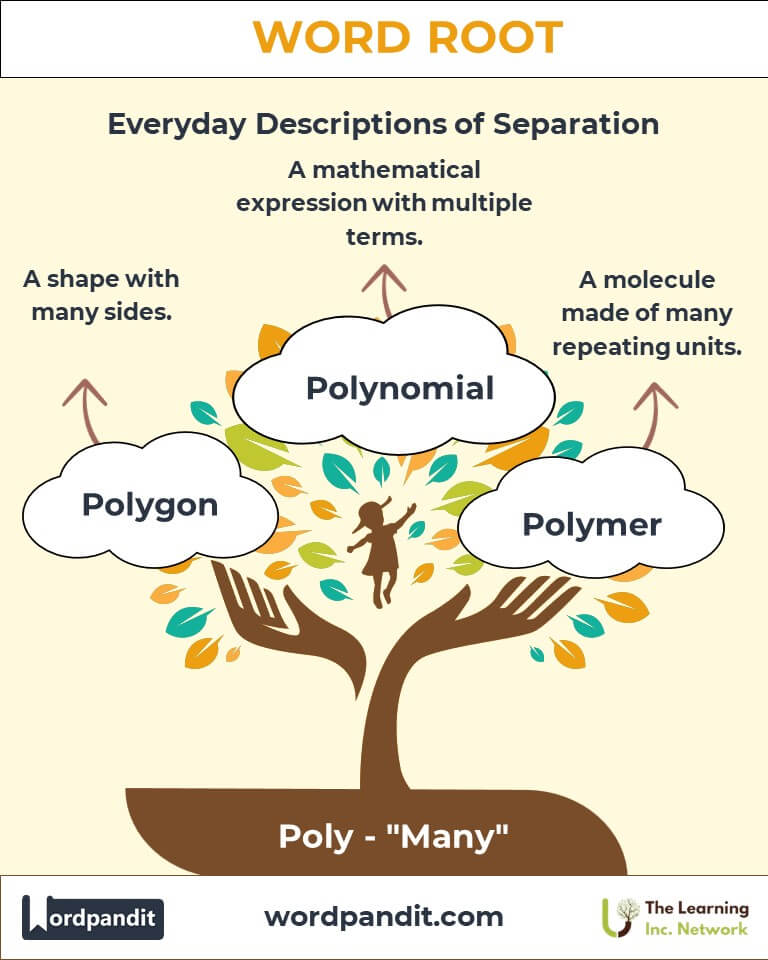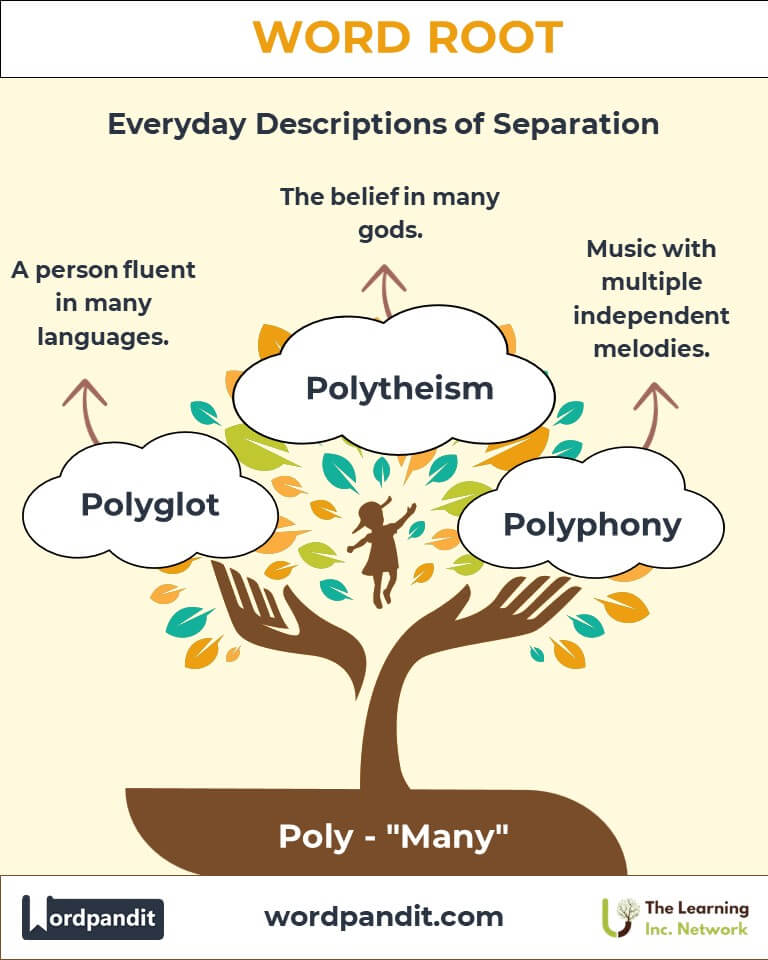Poly: The Root of Multiplicity in Language and Thought
Discover the linguistic richness and versatility of the root "poly," derived from Greek, meaning "many." From geometric wonders like polygons to linguistic marvels like polyglots, the prefix "poly" shapes our understanding of multiplicity across disciplines.

Table of Contents
- Introduction: The Essence of "Poly"
- Etymology and Historical Journey
- Mnemonic: Unlocking the Power of "Poly"
- Common "Poly"-Related Terms
- "Poly" Through Time
- "Poly" in Specialized Fields
- Illustrative Story: "Poly" in Action
- Cultural Significance of the "Poly" Root
- The "Poly" Family Tree
- FAQs about the "Poly" Word Root
- Test Your Knowledge: "Poly" Mastery Quiz
- Conclusion: The Living Legacy of "Poly"
1. Introduction: The Essence of "Poly"
Imagine a world with infinite possibilities—where multiplicity reigns supreme. This is the domain of "poly," a Greek root meaning "many." Pronounced as "pah-lee" or "po-lee," this prefix breathes life into words that describe abundance, diversity, and variety. From the many-sided shapes of geometry (polygons) to individuals fluent in multiple languages (polyglots), "poly" illuminates the richness of multiplicity across disciplines.
2. Etymology and Historical Journey
The root "poly" originates from the Greek word polys, which translates to "many" or "much." Over centuries, it fused with other roots and suffixes, becoming a cornerstone in diverse fields such as mathematics, linguistics, and science. Ancient philosophers and scholars like Pythagoras employed "poly" to explore the complexities of shapes and numbers, while linguists celebrated it to describe multilingualism.
3. Mnemonic: Unlocking the Power of "Poly"
To remember "poly," envision a bustling marketplace filled with a variety of goods, people, and sounds—a vibrant tapestry of "many" things.
Mnemonic Device: "Poly opens the door to plenty—many sides, many tongues, and many wonders!"
4. Common "Poly"-Related Terms
- Polygon (pol-ee-gon): A shape with many sides.
Example: "A hexagon is a polygon with six sides." - Polyglot (pol-ee-glot): A person fluent in many languages.
Example: "The polyglot impressed everyone by switching between five languages effortlessly." - Polygamy (pol-ee-gam-ee): The practice of marrying multiple spouses.
Example: "In some cultures, polygamy is an accepted tradition." - Polytheism (pol-ee-thee-izm): The belief in many gods.
Example: "Ancient Greeks practiced polytheism, worshipping gods like Zeus and Athena." - Polynomial (pol-ee-no-mee-uhl): A mathematical expression consisting of multiple terms.
Example: "The equation was simplified into a polynomial for easier calculation." - Polygraph (pol-ee-graf): A device that records multiple physiological indicators, often used as a lie detector.
Example: "The polygraph test showed no signs of deception."
5. "Poly" Through Time
- Polis (Ancient): In ancient Greece, "polis" referred to city-states, emphasizing the collective nature of many citizens.
- Polyphony (Renaissance): In music, "polyphony" described compositions with multiple independent melodies, reflecting the complexity and richness of sound.
6. "Poly" in Specialized Fields
- Mathematics: Polygon: Foundational to geometry, used to study shapes with multiple sides.
- Biology: Polyploid: Organisms with more than two sets of chromosomes, vital in genetic studies.
- Linguistics: Polyglossia: The coexistence of multiple languages within a society.
- Technology: Polymer: Large molecules made of many repeating units, essential in material science.
Illustrative Story: "Poly" in Action
Maya, a polyglot with a passion for travel, found herself in a bustling bazaar in Istanbul. Surrounded by merchants, she switched seamlessly between Turkish, French, and English, negotiating deals and forging connections. Her ability to speak "many" tongues exemplified the essence of "poly," bringing unity to diversity in a vibrant world of possibilities.
Cultural Significance of the "Poly" Root
The prefix "poly" resonates deeply in culture, symbolizing complexity and diversity. From the polytheistic traditions of ancient civilizations to modern polyphonic compositions in music, it highlights humanity's celebration of variety and multiplicity.
The "Poly" Family Tree
- Multi- (Latin: "many"):
- Example: Multitask (to handle many tasks simultaneously).
- Mega- (Greek: "large, great"):
- Example: Megapolis (a large urban area).
- Pan- (Greek: "all"):
- Example: Panorama (a view of all directions).

FAQs About the "Poly" Word Root
Q: What does "Poly" mean?
A: "Poly" comes from the Greek word "polys," meaning "many" or "much." It is used as a prefix in various words to indicate abundance, diversity, or multiplicity, such as "polygon" (a shape with many sides) and "polyglot" (a person fluent in many languages).
Q: How is "Poly" used in mathematics?
A: In mathematics, "Poly" appears in terms like "polygon," which describes a shape with many sides, and "polynomial," a mathematical expression with multiple terms. These terms illustrate how "Poly" conveys the idea of "many" in geometric and numerical contexts.
Q: What is a polyglot?
A: A polyglot is a person who is fluent in many languages. This term highlights linguistic diversity and the ability to communicate across different cultures, which is highly valued in today's interconnected world.
Q: What is a polymer?
A: A polymer is a large molecule composed of many repeating subunits, known as monomers. Polymers are vital in material science and biology, forming the basis of substances like plastics, rubber, and DNA.
Q: How does "Poly" relate to linguistics?
A: In linguistics, "Poly" appears in terms like "polyglot" (speaking many languages) and "polysemy" (a word with many meanings). These uses underscore the richness and diversity of language.
Test Your Knowledge: "Poly" Word Root Quiz
1. What does the root "Poly" signify?
2. Which term describes the belief in many gods?
3. What does "polyglot" mean?
4. What is a polygon?
5. What is a polymer?
12. Conclusion: The Living Legacy of "Poly"
The root "poly" celebrates abundance and variety, enriching language and thought. From ancient philosophies to modern science, it serves as a testament to humanity's fascination with complexity and diversity. Explore the words shaped by "poly," and embrace the many wonders they unveil!













